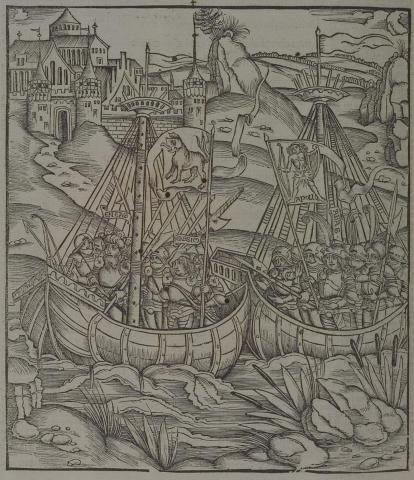CORE VOCABULARY
Massicus, ī, m.: an Etruscan warrior, 10.166.
aerātus, a, um: adj. (aes), furnished with copper, bronze; made of bronze, 2.481; bronze-covered; with brazen prow, 8.675; armed with bronze; armed, 7.703.
prīnceps, ipis: adj. (primus and capiō), first; chief; foremost, 5.160; subst., m., a chief, leader, commander, prince, 1.488; progenitor, founder, ancestor, 3.168.
secō, secuī, sectus, 1, a.: to cut, freq.; cut off, 4.704; engrave, carve, 3.464; cut through, cleave, 5.218, et al.; of the channel of a river, 8.63; sail through, pass, 8.96; speed, 6.899; shape out mentally, form, 10.107.
Tigris, is or idis, f.: the name of a ship, 10.166.
manus, ūs, f.: the hand, 1.487; freq.; (meton.), action, movement of the hand; work, art, handiwork, 3.486; prowess, heroic deed, action, 2.434; force, violence, 2.645; a collection of persons; a band, crew, troop; an army, 2.29; forces, 5.623; multitude, 6.660; pl., manūs, workmen, 11.329; dare manūs, to yield, 11.558; extrēma manus, the finishing hand or touch, 7.572.
Clūsium, iī, n.: one of the chief cities of Etruria, now Chiusi, 10.167.
linquō, līquī, 3, a.: to leave, 1.517, and freq.; desert, abandon, flee from, 3.213; pass by, 3.705; depart from, leave, 3.124; of death, yield up, 3.140; give up or over, desist from, 3.160.
Cosa, ae, and Cosae, ārum, f.: Cosa, a town in Etruria, 10.168.
sagitta, ae, f.: an arrow, 1.187, et al.
gōrȳtus, ī, m.: a quiver, 10.169.
umerus, ī, m.: the upper bone of the arm; the shoulder, 1.501, and freq.
lētifer, era, erum: adj. (lētum and ferō), death-bringing; deadly, 3.139.
arcus, ūs, m.: a bow, 5.500, et al.; the rainbow, 5.88.
ūnā: (adv.), in one place or at one time, together with, at once, at the same time, 3.634, et al.; with -que following, 11.864.
torvus, a, um: stern, grim, wild; savage, lowering, 3.677; fierce, 6.571; shaggy, 3.636; adv., torvum and torva, sternly, wildly, 7.399; 6.467.
Abās, antis, m.: 1. The twelfth king of Argos, grandson of Danaus, 3.286. 2. A Trojan, follower of Aeneas, 1.121. 3. An Etruscan, 10.427.
īnsīgnis, e: beautiful, 3.468; splendid, adorned, 4.134; conspicuous, 6.808; marked, renowned, distinguished, 1.10; illustrious, glorious, 10.450. (in and sīgnum)
aurātus, a, um: adj. (aurum), gilded, golden, of gold, 12.163; embroidered with gold, 5.250.
fulgeō, fulsī, 2, and fulgō, 3, n.: to shine brightly; flash, gleam, glance, 5.562.
Apollō, inis, m.: Apollo, son of Jupiter and Latona; the god of prophecy, medicine, music, poetry, and archery, 2.430; met., a temple of Apollo, 3.275.
puppis, is, f.: the hinder part of a ship; the stern, 5.12; (by synecdoche), a vessel, boat, ship, 1.69; (meton.), crew, 8.497.
sēscentī, ae, a: num. adj. (sex and centum), six hundred, 10.172.
Populōnia, ae, f.: a town on the coast of Etruria near the modern Piombino, 10.172.
Ilva, ae, f.: an island near the coast of Etruria, now Elba, 10.173.
trecentī, ae, a: num. adj. (trēs and centum), three hundred, 10.173, et al.
inexhaustus, a, um: (adj.), unexhausted; inexhaustible, 10.174.
Chalybes, um, m.: a people of Pontus, skillful in making steel; the Chalybes; (meton.), masses of steel or iron, 8.421; metalla Chalybum, mines of iron, 10.174.
generōsus, a, um: adj. (genus), of high lineage, noble-blooded, generous, renowned, famed, 10.174.
metallum, ī, n.: a mine; metal, 6.144.
interpres, etis, c.: an agent between parties; a mediator, messenger, 4.355; author, 4.608; prophet, 3.359.
Asīlās, ae, m.: 1. A Trojan warrior, 9.571. 2. An Etruscan chief and soothsayer, 10.175.
pecus, udis, f.: one animal of a flock or herd; an animal, 1.743; a sheep, 3.120; victim for sacrifices, 4.63.
fibra, ae, f.: a fiber, 6.600; root; entrail.
praesāgus, a, um: adj. (praesāgiō), divining, prophetic, 10.177; foreboding, w. gen., 10.843, et al.
fulmen, inis, n.: lightning, 10.177; thunderbolt, 2.649, et al.; thunder, 1.230. (fulgeō)
dēnsus, a, um: (adj.), thick, dense, crowded, compact, in close array, serried, 2.383; frequent, 5.459.
horrēns, entis: bristling, bristly, 1.634; rough, roughening, 1.165; fierce, 10.237. (horreō)
hasta, ae, f.: a spear, 2.50, and freq.; hasta pūra, a headless spear, 6.760; pampinea hasta, a thyrsus, 7.396.
iubeō, iussī (fut. perf. iussō for iusserō, 11.467), iussus, 2, a.: to order, request, usually w. inf., freq.; bid, 2.3; ask, invite, 1.708; will, wish, desire, 3.261; direct, enjoin, admonish, 3.697; persuade, advise, 2.37; to clear by command, 10.444; w. subj., 10.53.
Alphēus, a, um: (adj.), of the Alpheus, Alphean, 10.179.
orīgō, inis, f.: a source, origin, beginning, 1.372; descent, lineage, birth, 1.286; source, root, founder, 12.166. (orior)
Pīsae, ārum, f.: a city of Etruria, now Pisa, 10.179.
Etrūscus, a, um: adj. (Etrūria), Etrurian, Tuscan, 8.503; subst., Etrūscī, ōrum, m., the Etrurians, Tuscans, 9.150.
solum, ī, n.: the bottom or ground of anything; soil, earth, ground, 1.367, et al.; land, 3.698; foundation, 10.102; the water beneath a ship, as its support; the water, sea, 5.199; support, table, 7.111.
Astur, uris, m.: Astur, an Etruscan chief, 10.180.
fīdō, fīsus sum, 3, n.: to confide, trust, rely; freq., w. dat., 7.290; w. abl., 5.398; w. inf., dare, 5.69; p., fīdēns, entis, trusting, bold, confident, w. abl., dat., or gen., freq. (rel. to πείθω, persuade)
versicolor, ōris: adj. (versō and color), of various colors, particolored, 10.181.
ter: (num. adv.), thrice, three times, 1.94, et al. (trēs)
adiciō, iēcī, iectus, 3, a.: to throw to or upon; add, join, 12.837. (ad and iaciō)
Caere, n., indeclin. (gen. Caeritis, f., abl. Caerēte, f.): Caere or Agylla, in the southern part of Etruria, now Cervetri, 8.597; 10.183.
Miniō, ōnis, m.: a small river in the southern part of Tuscany, 10.183.
Pyrgī, ōrum, m.: a tower on the coast of Etruria, 10.184.
intempestus, a, um: unseasonable; unpleasant; gloomy, dark, 3.587; of unhealthy atmosphere or climate, malarious, unhealthy, 10.184.
Graviscae, ārum, f.: Graviscae or Gravisca, a Tuscan town, 10.184.

